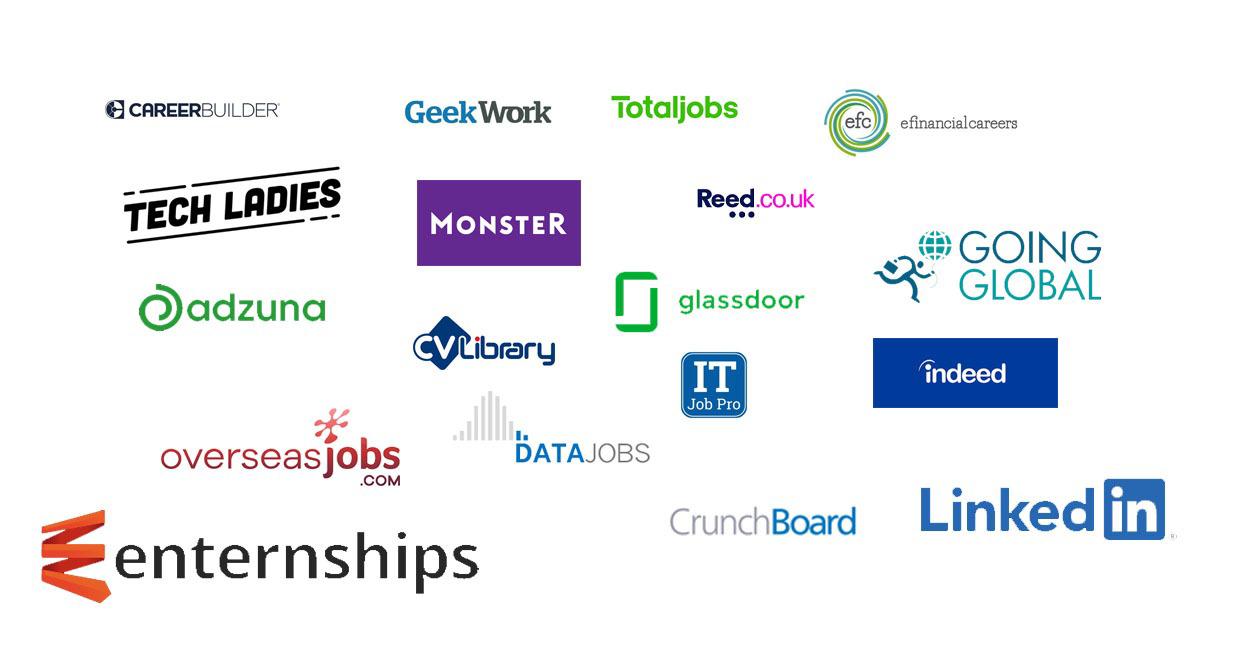Top Tech And IT Job Boards For 2023
- In Employment
- 27 Jan 2023, 04:38 AM

With a strong economy and several large cities hosting major employers, the United Kingdom has traditionally been a popular destination for job seekers. However, regulations have changed as the country left the EU in 2020. According to the Office for National Statistics (ONS), the total unemployment rate in the UK was 3.9 per cent in May 2020, which is at its lowest point in 40 years. However, the rise in zero-hour contracts, which have doubled in the last decade to 896,000 in 2019, explains some of this.
Economic growth is centred in London and the southeast, whereas unemployment is higher in Scotland, Wales, and Northern Ireland. The London job market is flourishing, with ten times the number of positions available as the next best area of the country, but those jobs are in high demand.
Finding the perfect job
It's as much about being prepared and knowing where to look and whom to talk to as it is about having the essential skills and qualifications to get a decent job in London. Your job search strategy may include applying directly to businesses, consulting firms, or job boards. Individuals can make a list of companies they want to use and communicate with their IT and HR departments. If there is a relevant job, one can also upload their CV to their career portal. Your CV should include a summary, educational qualifications, professional experience, skills and accomplishments, interests, references, and your contact information (name, address, phone number, and email address). Professionals should avoid including their photographs, graphics, logos and tables in their CV.
In the UK, networking is one of the most significant components of the job search. It's vital to understand that expanding your network is an excellent way to meet new people and locate new job opportunities. LinkedIn is immensely popular in the United Kingdom. Join LinkedIn groups relevant to your industry and network with professionals in the UK. International candidates can utilise the Advanced Search Tool on LinkedIn to improve their job search experience. Individual contacts might also be contacted for suggestions or referrals. Viewing and following the career section of company pages is also recommended.
Finally, after familiarising yourself with your CV and the position you're interviewing for, you'll need to practise answering common interview questions while preparing for the interview. To demonstrate to the interviewer that you are serious about your abilities, you should back up each of your capabilities with an example. A frequent way to display your abilities is the STAR method. The first is the Situation; describe your position, and why you were there to provide some context for the story you're about to tell. Second, describe the Task you completed and any challenges you experienced. The following section is Action; which details the measures you took to complete the project and how you overcame any barriers. Finally, the Results should illustrate your ability, as well as what you accomplished and what you learned from the situation.
Best job sites
You'll likely find your next big career move if you look for the top UK employment sites. You'll be able to see all of the finest chances if you use the correct sites, and recruiters will be able to see all of your pertinent information alongside your CV.
A good job site will have an extensive database of listings, and the best ones will include full-time, part-time, and freelance employment, as well as remote and flexible positions. The most satisfactory sites go above and above, with social networking tools and abilities assessments on some and analytical filtering and company ratings on others.
Indeed
Indeed is one of the most prominent job boards on the internet. The figures are remarkable: it's been around since 2004, has over 250 million monthly visitors, and hosts a whopping 200 million CVs. According to the company, ten jobs are added to the site every second.
Glassdoor
Although Glassdoor is not the only job site that includes employer reviews from current and past employees, it was the first to do so and emphasised them more than most of its competitors. Glassdoor also contains much compensation information to see if an organisation pays well and learn more about its benefits and interview processes.
Reed
Reed is one of the first UK-specific job boards, and it has a lot to offer: at the time of posting, the site has approximately 300,000 job ads in every major industry. If you're unsure what search terms to use, you can browse jobs by sector, region, and trending topics. You can also filter jobs by various criteria, including unusual selections like whether a job is appropriate for a new graduate, whether it's possible to work from home, and whether an agency or the employer posted it. This website has more filtering options than almost any other.
TotalJobs
At any given time, TotalJobs has over a quarter of a million UK-based jobs posted. Its front page is certainly comprehensive: in addition to the standard search box, you can browse recommended jobs and navigate via tabs that emphasise positions in various locations, sectors, and firms.
CV-Library
CV-Library is one of the largest UK-specific employment portals, with up to a quarter of a million positions from over 10,000 organisations available at any given moment. There's lots of variety in every significant business, with Lotus, Sky, Ocado, and Games Workshop all using the site to locate employees. Job postings are simple, and CV-Library has a convenient one-click application system, making it simple to apply for a suitable position.
Adzuna
Adzuna is one of the most creative UK-based employment sites, so it's well worth checking out if you want to speed up your job search and try something new. It's also completely free to use. The company often has over one million job openings on its website, and it uses a data-driven strategy to optimise job searches, with proprietary algorithms to assist deliver better matches.
Monster
Monster is one of the largest and most well-known employment sites in the United Kingdom, with an extensive database of job seekers, openings, and companies. It's also one of the most user-friendly UK employment sites, so it'll always be worth your time during a job search, and it's a great option if you're not very tech-savvy.
Job boards for tech professionals
Job boards exist to make the process easy for everyone involved, including employers and job seekers. Although many job-search services, such as Indeed and LinkedIn, focus on open openings across various industries, some, such as Crunchboard or Tech Ladies, are primarily targeted at the tech sector.
Tech Ladies
Tech Ladies is especially for women in technology who must apply for membership. Tech Ladies filters applicants and job postings, ensuring that users are not subjected to toxic interviews or scams. It's also worth noting that Tech Ladies has over 100,000 members, indicating that it's more than just a job board. The site hosts webinars for women in IT, coding lessons, career guidance, and more. It's also a wonderful place to meet other women in the sector.
GeekWork
GeekWork is a perfect destination to go to if you're looking for a career in tech and want to work for a startup. Users of GeekWork can search for employment based on tags such as machine learning, social media, Linux, Python, and more. Consulting, freelancing, part-time, full-time, and temporary options are also available on the job board.
DataJobs
There is no shortage of tech opportunities on DataJobs for data scientists looking for new employment. DataJobs, founded by Frank Lo, Director of Data Science at Wayfair, is a job board where data professionals may look for open positions at leading firms.
Crunchboard
If you're familiar with TechCrunch, you've probably heard about CrunchBoard. CrunchBoard is an excellent site for tech employment. To stay up with the latest job postings on this tech platform, search its database by keyword or sign up for job notifications.
IT Job Pro
IT Job Pro is the most renowned specialist site for tech employment, according to Entrepreneur Magazine. Since its inception in 2010, over 2 million job searchers have accessed this employment board. Open positions at Tesla, Teradata, pony.ai, and other companies can be found in its current listings.
Overseas and expat job portals
Finding a job can be a difficult and time-consuming process. As vital as preparing for and passing the many selection phases is connecting with the appropriate individuals. Here are some of the most beneficial web resources for expats looking for work:
LinkedIn is often referred to as the world's largest professional social networking site, with over 175 million users from over 200 countries. It is estimated that two new members join this website every second. This platform is increasingly being used by businesses to hire professionals from all over the world.
eFinancialCareers
This website is a large network of several career sites for banking and finance professionals. eFinancialCareers is not just for experienced professionals; graduates and students who want to work in the financial business can also join up for this platform, which is available in over 22 regions and five languages.
CareerBuilder
This website is one of the most renowned job websites for online jobs globally, and CareerBuilder claims to be one of the top 30 most visited websites on the internet. This firm, which was founded in 1995, has several portals that list job openings in about 60 countries in multiple languages.
Enternships
This website, which was founded in 2009 by Oxford graduate Rajeeb Dey, primarily targets students and recent graduates, linking them to entry-level jobs and internships in a variety of entrepreneurial firms. Over 6,000 startups and fast-growing firms have been linked with the institution globally. Because Enternships is situated in London, the majority of the job ads are from the United Kingdom.
Overseas Jobs
OverseasJobs.com is a simple-to-use community where job seekers and employers from all around the world can communicate. For more than a decade, the site has specialised in offering potential employers low-cost availability of a wide range of job seekers in various industries and places. Professionals can register for free, upload their resumes, and search for job openings.
Going Global
A group of professionals who lived and worked outside their home nations established Going Global. Their goal was to provide "grass-root intelligence" to those looking for work abroad. Aside from job ads, this service also provides information on work permits for numerous nations.
Challenges an expat may face
Many companies employ foreign workers to fill positions requiring specialised technical or business abilities that are not available in the UK. At the same time, international professionals provide value to organisations by introducing fresh, inventive ideas that help organisations increase production and efficiency while also growing into new global markets. Employees from other countries can also assist companies in filling temporary positions that require a specific skill set.
An overseas professional, on the other hand, may confront a variety of challenges.
Tired of applying on job boards but not getting a response
Because many international professionals are unaware of the proper job boards, their possibility of obtaining a response from an employer is minimal. At the same time, the UK job market is highly specialised compared to more generalist markets such as India. Professionals must stand out in a global candidate pool with severe competition in order to obtain a call back from a potential employer.
Getting calls from recruiters but they ask for a work permit
Professionals are encouraged to use LinkedIn to network with future employers, which will improve their chances of landing a job in the UK. Furthermore, it has been seen that professionals use the incorrect approach when communicating with potential employers, reducing their chances of being hired or sponsored by the firm.
Attended interviews but could not clear
Failure to clear an interview can occur for a variety of reasons, including a lack of understanding of British body language, inappropriate interview attire, talking too much or too little during the interview, mistaking an interview for interrogation while failing to ask necessary questions, and professionals are advised not to make a perceived weakness appear favourable.
The greatest UK employment sites offer scores of prospects for any keen job seeker and excellent filtering and search features to match you with more relevant and accurate postings. Some of these services allow users to join social networks, which can be pretty valuable for networking and creating connections at a new job, creating job searching less lonesome than it once was.





